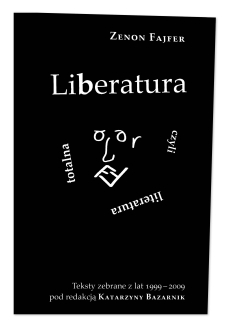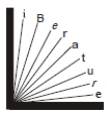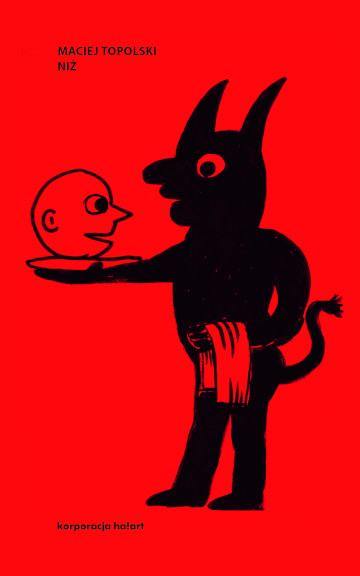Niż
Niż Macieja Topolskiego to zbiór próz poetyckich zawierających elementy eseju i reportażu, które poświęcone są pracy kelnerskiej. Książka podzielona została na pięć części (poprzedzonych cytatami z podręcznika przygotowującego do zawodu kelnera), w których autor opisuje kolejne aspekty pracy w gastronomii. Od rekrutacji przez kontakt z klientem po...Read MoreLiberature Or Total Literature

| Tytuł: | Liberature Or Total Literature. Collected Essays 1999-2009 |
| Autor: | Zenon Fajfer |
| Redakcja: | Katarzyna Bazarnik |
| ISBN: | 978-83- 64057-78-6 |
| Seria: | Liberatura |
| Język: | English |
| Tłumaczenie: | Katarzyna Bazarnik |
| Projekt książki: | Zenon Fajfer |
| Data premiery: | 2010-06-05, Belfast / Kraków |
| Liczba stron: | 384 - 192 (English) + 192 (Polish) |
| Cena: | free publication; Open Access material, CC 3.0 |
The printed book contains a bilingual collection of programmatic essays and articles by Zenon Fajfer, poet and theorist of liberature, edited and translated Katarzyna Bazarnik, with an introduction by Prof. Wojciech Kalaga, and three complementary essays by Katarzyna Bazarnik, Agnieszka Przybyszewska and Łukasz Jeżyk.
The book was launched on 5 June 2010 at the University of Belfast during 5th IAWIS Focus Conference “Displaying Word and Image”, where a special panel was devoted to liberature.
• • •
FREE PDF OF THE ENGLISH VERSION CAN BE DOWNLOADED HERE:
• • •
Polska wersja dostępna tutaj
• • •
• • •
“The requirements posed by liberature shape a new kind of recipient. The experience and the behaviour of an empirical reader in the traditional mode are rather precisely programmed: he follows the footsteps of the model reader through the paths delineated by the text, and his task is to approach his virtual prototype as closely as possible. A certain variation and at the same time a disturbance in this structure of expectations and strategies was the recognition of open works (Umberto Eco) or scriptible texts (Roland Barthes) which introduce uncertainty and play into those structured expectations and modes of behaviour. (…) The liberary text is the crowning of this tendency: here the visuality plays a role just as important as the semantics of language. Such a text enforces a reading which is nonsequential, nonlinear, and which enforces (more or less conscious, more or less contingent) decisions.”
Wojciech Kalaga
(From the Introduction)
• • •
Word is the substance of literature.
When we say the word, we stress its sound and sense,
when we write the word, we (sometimes ) also mean its appearance.
Space
is hardly ever taken into consideration, if at all.
However, in order to come into existence in time
the word needs space.
Space belongs to it as much as its
shape,
sound
and meaning.
The word thus conceived is the substance of

Liberature
or total literature
in which the text and the space of a book constitute an inseparable whole.
The physical object ceases to be a mere carrier of text;
the book does not contain a literary work, but
i t i s i t s e l f t h e l i t e r a r y w o r k.
Its pages are as verses in a poem: there are as many of them
as there should be, and they look exactly as they should.
The architecture and the visual aspect of the work are no less important
than its plot and style.
However, there is no reason for constraining oneself to the
traditional form of the codex.
The work can assume any shape at all and be made
of any material.
Zenon Fajfer
(From “epic, lyric, dramatic, liberature”)
• • •
On Liberatura series:
Published since 2003 Liberatura, an imprint of Korporacja Ha!art, is a unique phenomenon not only on the Polish publishing scene. Its originality stems from the recognition that some literary works integrate word with the space of its inscription; in them text and the form of the book (Lat. liber) are fused into an organic whole. Liberature distinguishes itself from other publishing lines because each of work appearing in it has its individual material form. Particular titles are not unified by an identical design, since the material form of the book is part of the author’s vision and is shaped accordingly. Apart from Polish writers, the series includes such highlights as S. Mallarmé’s The Throw of the Dice Will Never Abolish Chance (bilingual), R. Queneau’s One Hundred Thousand Billion Poems, G. Perec’s Life User’s Manual, H. Müller’s box of poetic collages Der Wächter nimmt seinen Kamm (bilingual), and J. Joyce’s Finnegans Wake.
• • •
Zenon Fajfer (1970), Polish poet, playwright, creator and theoretician of liberature, a new literary genre which embraces works that integrate the word with unconventional shapes of the book. He introduced into poetry an original, interactive form called “the emanational poem,” in which he simultaneously creates invisible, dimensions of text. He also uses the new media, creating his own version of kinetic poems and hypertextual poetry. Co-author, with Katarzyna Bazarnik, of books initiating the phenomenon of liberature: a triptych Oka-leczenie (Mute-I-Late, 2000, 2009) and (O)patrzenie (Ga(u)ze, 2003) and a poetic happening Liberty Poem (New York, Chicago, Taipei, Tokyo, 2011); the author of the poem-in-a-bottle Spoglądając Przez Ozonową Dziurę (Detect Ozone Whole Nearby, 2004), a bilingual multimedia poetry volume dwadzieścia jeden liter/ten letters (2010), Liberature or Total Literature. Collected Essays 1999-2009 (2010), Pieta, a drama which he staged and directed in Łaźnia Nowa Theatre (Kraków, 2006, 2012), a hypertextual volume of emanational poetry Powieki (Eyelids, 2013), and Widok z głębokiej wieży (A View from the Deep Tower, 2015). He has presented his works in many countries, including the USA, Japan, Taiwan, the UK, Ireland, France, and Italy.
• • •
Katarzyna Bazarnik is a literary scholar, translator, and editor, an assistant professor at the Institute of English Philology of the Jagiellonian University in Krakow, and a lecturer in the postgraduate programme for Literary Translation, where she runs translation workshops. Together with Zenon Fajfer she wrote the first books to be called liberature: a triple-volume Oka-leczenie (Mute-I-Late, prototype edition 2000, 1st ed. 2009) and (O)patrzenie (Ga(u)ze, 2003), which initiated “Liberatura” series of Korporacja Ha!art Publishing House, which they coedit. They also published Sonnet of Sonnets (2012), devised together with students of the MA Programme in Creative Writing and Bookmaking in Mills College, Oakland, CA. In 2002 Bazarnik and Fajfer founded Liberature Reading Room (now in Malopolski Garden of Arts of the Małopolska Province Library in Kraków). She published a monograph Joyce and Liberature (Litteraria Pragensia, 2011), and has edited or co-edited several volumes of essays, including Wokol Jamesa Joyce’a (Around James Joyce, 1998), Od Joyce’a do liberatury (From Joyce to Liberature, 2002), James Joyce and After. Writer and Time (2010), Incarnations of Textual Materiality (2014) and two monograph issues of a translation journal Literatura na Świecie (Literatures of the World) devoted to James Joyce (2004) and B.S. Johnson (2008). Her translation of B.S Johnson’s TheUnfortunates was awarded at the Wrocław Good Books Fair in 2008. Her theoretical work on liberature as a new literary genre integrating the verbal content with the material shape of the book introduced the concept to the academic world in the UK, Ireland, France, Japan, Taiwan and the USA.
• • •
Reviews and articles:
- kulturaliberalna.pl: Paulina Sieniuć o książkach Zenona Fajfera
- dwutygodnik.com: Wojciech Kalaga o liberaturze
• • •
Other books by Zenon Fajfer published by Korporacja Ha!art:
- dwadzieścia jeden liter / ten letters (2010)
- Zenon Fajfer - Liberatura czyli literatura totalna. Teksty zebrane z lat 1999-2009 / Liberature Or Total Literature. Collected Essays 1999-2009 (2010)
- Oka-leczenie / (O)patrzenie, Katarzyna Bazarnik i Zenon Fajfer (2010)
- Co to jest liberatura, Katarzyna Bazarnik i Zenon Fajfer (2008)
- Spoglądając przez ozonową dziurę (2003)
- (O)patrzenie, Katarzyna Bazarnik i Zenon Fajfer (2003)






